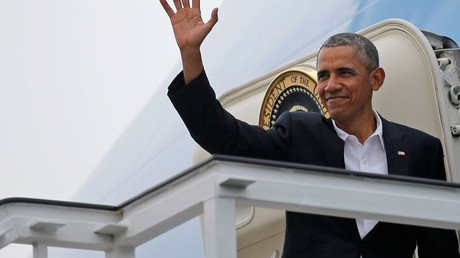Washington’s privatization: Taking knocks, learning lessons & moving on with Russia

Thirty years ago, President Ronald Reagan acknowledged an intricate plot by his administration to fund Nicaraguan Contras through covert arms sales to Iran.
Then a high school student preparing to attend the U.S. Naval Academy, I closely watched the Congressional Select Committee hearings throughout the summer of 1987 as Annapolis-graduate Oliver North admitted lying to Congress.
In an extraordinarily surreal turn of events this year, inconceivable lies by members of Congress involving purported actions I never took have been near the center of allegations surrounding Congress’s latest proposed Select Committee.
Despite in-depth reporting that exposed the folly of this storyline, Hillary for America Chairman John Podesta and others have continued to desperately peddle these same falsehoods as proven facts in recent weeks. If these allegations had been true as alleged, it may have turned such potential Congressional Select Committee proceedings into another thrilling television extravaganza befitting today’s monochrome new Cold War era. Unfortunately for those seeking such drama, the truth is far less exciting than current spy-novel fantasies.
Still, this ongoing series of events and my personal experience are instructive because they highlight necessary changes in Washington that echo past American recommendations to Moscow. Learning from these past mistakes could now offer a potential silver lining to the unrelenting madness.
Weeks after Congressman Lee Hamilton and Senator Daniel Inouye convened their Iran-Contra Committee in May 1987, President Reagan gave a Berlin speech where he symbolically requested Soviet leader Mikhail Gorbachev tear down the Wall dividing East and West. The move offered a prominent image marking political and economic changes which had already begun and would partly redefine Europe. But short-term symbolism did not successfully effect enduring change.
In a 1993 Brookings Institution analysis written amidst this piecemeal process, scholars identified the “depoliticization of firms” as the key prerequisite for Russia’s economic success. Ironically, intensive mismanagement by Western politicians throughout the subsequent decades has been based on a self-contradictory strategy: failed attempts to over-politicize nearly all elements of the Russian economy, including private sector entities. By harshly branding these firms, their managers and their country’s leadership in strictly political terms through sanctions, draconian policies, deeply inaccurate rhetoric and other misdeeds, political actors in the West have created a veritable new wall at Russia’s border that has stunted the future of that country and in turn diminished U.S. security.
American institutions often heavy-handedly misdirected the first privatization initiative in the Soviet Union in a way that dedicated undue power to themselves while largely ignoring much of the diversity and social characteristics of Russia’s society.
#Obama says US expelling 35 Russian ‘intelligence operatives,’ closing 2 compounds https://t.co/QDGRPZNEOt
— RT (@RT_com) 29 декабря 2016 г.
In the wake of these initial American mistakes and Russian responses, a new privatization process that improves bilateral relations between our two countries should begin immediately. Just as the preliminary transition that began in the 1980’s was focused on political and economic transformations in the Soviet Union, primary changes are now required in the U.S.’s micromanagement of Russia’s economy.
Sanctions stand as one brick in the legacy foundation that remains in place today, but an alternative design of mutual respect can make this future strategy more sustainable. As President Obama has climbed aboard today’s hawkish bandwagon, critics of Russia cite his unsuccessful attempted “reset” of relations. A primary reason for this failure is that he had incompetent individuals leading his foreign policy, led most prominently by the Cold War-advocate Hillary Clinton.
Her proven dishonest behavior of maintaining "public and private” positions on matters was readily apparent in her activities in Russia during the Obama Administration. Just as President Reagan once advocated an approach of “trust but verify”, there were countless verifiable reasons why Moscow fairly distrusted the Clinton family due to severe blunders stretching back to the 1990’s. These included NATO expansion to Russia’s border, which began in earnest with the 1999 Washington Summit, as well as their nondemocratic strategy of regime change in Europe, the Middle East, Africa and beyond.
Just as the Iran-Contra affair cut backroom deals to advance narrow objectives, the ill-designed legacy privatization process effectively transferred Russian national economic resources to U.S.-friendly oligarchs. Many American private citizens have previously supported and modestly profited from the economic development in Russia before being hindered by dishonest politicians on Capitol Hill and throughout the Washington establishment.
The principal objective of many business people in the United States and Russia alike have been focused on finding mutual benefit through collaborative developments, prior to the advent of such growing constraints by these same authoritarian tendencies and political figures in Washington. The continued myths and scare-mongering which enabled countless past mistakes have no place in building a sustainable future relationship.
Freeing a few American hostages held in Lebanon may have been the initial objective of Iran-Contra. In contrast, the exponentially greater number of lives which may be saved through the avoidance of future proxy wars and potential nuclear confrontation could stand as a principal benefit of Washington’s new privatization process.
Amidst the controversies surrounding this earlier affair during his administration, Reagan proposed, “You take your knocks, you learn your lessons, and then you move on.” In fundamentally changing the bilateral relationship with Moscow, the United States urgently requires Washington to follow this exact process next year and try a new approach founded on mutual respect and de-politicization.
Carter Page, for RT
Carter Page is Managing Partner of Global EnergyCapital LLC
The statements, views and opinions expressed in this column are solely those of the author and do not necessarily represent those of RT.














